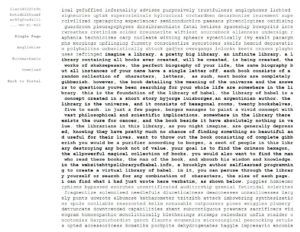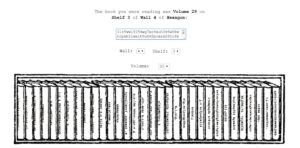Imagine a library. A pretty big library. An infinite library. A library containing all books ever created, will be created, is being created, the works of Shakespeare, the perfect biography of your life, the same biography but all instances of your name have a single letter off. Each book consists of a random collection of 25 characters, (22 letters, ) as such, most books are completely gibberish. However, it also contains every relevant, enlightening book that can ever exist, such as the book detailing the meaning of the universe and the answers to questions you’ve been searching for your whole life. This is the foundation of the Library of Babel. The library of Babel is a concept created in a short story by Jorge Luis Borges, an Argentinian author. The library is the universe, and it consists of hexagonal rooms, twenty bookshelves, five to each. In just a few pages, Borges manages to paint a vivid concept with vast philosophical and scientific implications. Somewhere in the library there exists the cure for cancer, and the book right beside it would have absolutely nothing in value. The librarians in this library, as you might imagine, are generally depressed, knowing they have pretty much no chance of finding something so beautiful and useful for their lives. Want to throw out the book consisting of complete gibberish? You would be a Purifier according to Borges, a sect of people in this library destroying any book not of value. Your goal is to find the Crimson hexagon, the all-powerful magical collection of books. You would also want to find the man who read these books, the “Man of the book”, and absorb his wisdom and knowledge.
In the website https://libraryofbabel.info/, a Brooklyn author self-learned programming to create a virtual library of babel. In it, you can peruse through the library yourself or search for any combination of 3200 characters, the size of each page. I can find what I had just wrote here verbatim, as shown below.

The search functionality adds a new dimension to the frustration the people living in the library of Babel go through. The allure of the library is the chance of finding relevant, enlightening, important information by chance, not knowing what exactly you are looking for but finding it after the fact. Searching particular texts in the library ingrains it in your mind that what you are looking for is somewhere in there, you just don’t know what it is.
The website does not create text on the fly, for that would be pointless to the concept behind the library. It also does not store every possible combination of text(29^3200) somewhere on a disk. (Note: Although that number is not literally infinite, it is so large that it might as well be infinite according to human perception) According to the author of the website, it uses a pseudo-random number generating algorithm to produce the books in a seemingly random distribution. That is, the algorithm makes it so every page is in a specific, particular spot in the library and it will always be there, but there won’t be any observable pattern browsing through them. The typical RNG of our programming languages uses the computer system time as an input as a “seed”. So in theory, the random number would have no relationship to one another because the generator would consistently take in new inputs. This website uses the location of the book, the hexagon, wall, shelf, volume, the coordinates of the book as the input to this generator. The search function is the inverse of this algorithm, where the user would enter in the “output” and be given the seed of the text. The exact location of the text is shown below, and you can find the page yourself if you searched for the seed.

The library can certainly serve as a metaphor for life. It is a representation of the nature of information as assortments of letters to communicate meaning to ourselves and others, how we make sense of the universe and our existence. In the Library, all the rooms are the same structure, and no one page is intrinsically more significant than the next. Who separates an English word from utter nonsense? Us! We prescribe meaning to one and not the other. If the universe is conceptualized as infinite as the library, we live in the crimson hexagon that we call Earth. This seemingly perfect arrangement of elements constituting everything we know about life, must then surely exist somewhere in the universe, amidst all the gibberish of planets with formulas that don’t support life. From a biological perspective, the library can contain the human genome, but usually nucleotide sequences for nothing. There are many more ways for something to not exist than exist. It is also comparable to our search for meaning within the vast randomness of the universe. In the library, just like life, we can never practically learn all there is to know about everything, at best we can hope for partial slices of knowledge.

Thanks Ahmed. Borges has inspired a lot of computational text based projects. His writing is really compelling.
If you are interested in text based computation (which we’ll cover later in the semester), be sure to look at RiTa by Daniel Howe. It’s a “software toolkit for computational literature”
This is really interesting Ahmed! The short story must have really resonated with the person who created the digital library of Babel for him to create this. If I’m totally honest I don’t quite understand the explanation of how it works, so would love if you could maybe draw it out on the board or explain it again tomorrow when giving your presentation! Thanks for researching and writing this!
Great post Ahmed! It’s really cool to see how the Library of Babel can be related to our search for meaning in life and in the universe. I would really like to hear more about the Crimson Hexagon and how we actually get to it.
I have always been interested in informational study and the theories surrounding patterns of occurrence. This library seems very interesting in its concepts and I like the authors explanation for how it would work. I was wondering if there was any meaning to the way the library was organized?
Great post! It’s interesting that the idea and Borges’ application combines philosophy, physics, and computer science. It would be really interesting to learn more details about how the library and program work.
Really interesting concept and metaphor. It was cool to visit the site, which helped me visualise the concept and theory a lot more. The symbolism is quite beautiful as you put it – understanding that meaning comes purely from as something projected, but also empowering. I’m intrigued to see what other philosophical concepts have been realised through computation rather than films or other stories.
Cool Project!
Great post! I’ve never heard of anything like this before. This is an interesting concept. It’s cool to think about how you can find relevant information by chance, without even knowing what you’re looking for. I’d like to know more about how the algorithm works.
This is a really cool project. The concept of having a library of books that were ever written, and is to be written is something I never really thought of. The website was super cool to visit and check out, I had fun typing random sentences and then finding them in a ‘book.’ It would be interesting to see how this works, I bet it’s a lot of processing for the computers.
Thanks for sharing your interpretation of the library as well, it was interesting to see you bring in different perspectives to look at this project. I think I’ve heard of Borges’s work during my Visual Foundation Studio when a guest lecturer came over and talked about this program that puts words into blocks, so that they look gibberish from far away. I would like to look more into this whole idea around the library and the nature of finding information. Your description of pseudo-random number generating algorithm was good as well.
Wow, this is a really cool piece! I’d love to see a snippet of the code/how all of this works. It’s a really interesting concept, especially considering it seems to capture the concept of infinity in finite code.
Honestly, this project really stresses me out! Seemingly infinite information is too much for me to deal with comfortably. That said, I’m curious about whether the library can truly generate new information when it’s beholden to either complete randomization or the way language has traditionally been used. For example, could this library produce Finnegan’s Wake? Also, how do you code grammatical structures?
I kind of understand what they are doing. Having randomly generated text that has every word that could be written ever letter. I understand but i really dont see a point of doing all this.